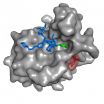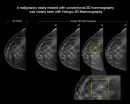Nutrition, safety key to consumer acceptance of nanotech, genetic modification in foods
2014-12-02
(Press-News.org) New research from North Carolina State University and the University of Minnesota shows that the majority of consumers will accept the presence of nanotechnology or genetic modification (GM) technology in foods - but only if the technology enhances the nutrition or improves the safety of the food.
"In general, people are willing to pay more to avoid GM or nanotech in foods, and people were more averse to GM tech than to nanotech," says Dr. Jennifer Kuzma, senior author of a paper on the research and co-director of the Genetic Engineering in Society Center at NC State. "However, it's not really that simple. There were some qualifiers, indicating that many people would be willing to buy GM or nanotech in foods if there were health or safety benefits."
The researchers conducted a nationally representative survey of 1,117 U.S. consumers. Participants were asked to answer an array of questions that explored their willingness to purchase foods that contained GM tech and foods that contained nanotech. The questions also explored the price of the various foods and whether participants would buy foods that contained nanotech or GM tech if the foods had enhanced nutrition, improved taste, improved food safety, or if the production of the food had environmental benefits.
The researchers found that survey participants could be broken into four groups.
Eighteen percent of participants belonged to a group labeled the "new technology rejecters," which would not by GM or nanotech foods under any circumstances. Nineteen percent of participants belonged to a group labeled the "technology averse," which would buy GM or nanotech foods only if those products conveyed food safety benefits. Twenty-three percent of participants were "price oriented," basing their shopping decisions primarily on the cost of the food - regardless of the presence of GM or nanotech. And 40 percent of participants were "benefit oriented," meaning they would buy GM or nanotech foods if the foods had enhanced nutrition or food safety.
"This tells us that GM or nanotech food products have greater potential to be viable in the marketplace if companies focus on developing products that have safety and nutrition benefits - because a majority of consumers would be willing to buy those products," Kuzma says.
"From a policy standpoint, it also argues that GM and nanotech foods should be labeled, so that the technology rejecters can avoid them," Kuzma adds.
The paper, "Heterogeneous Consumer Preferences for Nanotechnology and Genetic-modification Technology in Food Products," is published online in the Journal of Agricultural Economics. Lead author of the paper is Dr. Chengyuan Yue of the University of Minnesota. The paper was co-authored by Shuoli Zhao, a graduate student at UM. The research was supported by a grant from the U.S. Department of Agriculture.
INFORMATION:
ELSE PRESS RELEASES FROM THIS DATE:
2014-12-02
Bethesda, MD (Dec. 2, 2014) -- Women with celiac disease present with fertility problems no more often than women in the general population, according to a new study in Gastroenterology1, the official journal of the American Gastroenterological Association.
"Despite inconsistent findings from small studies, concern has been raised that celiac disease may cause infertility," said lead study author Nafeesa N. Dhalwani, PhD, from the University of Nottingham, United Kingdom. "Celiac patients should rest assured; our findings indicate that women with celiac disease do not ...
2014-12-02
A research team from Kiel University (CAU) and Goethe University Frankfurt has jointly created a synthetic surface on which the adhesion of E. coli bacteria can be controlled. The layer, which is only approximately four nanometres thick, imitates the saccharide coating (glycocalyx) of cells onto which the bacteria adhere such as during an infection. This docking process can be switched on and off using light. This means that the scientists have now made an important step towards understanding the relationship between sugar (carbohydrates) and bacterial infections. Their ...
2014-12-02
This news release is available in German.
The FK506-binding protein 51 (FKBP51) is an established risk factor for stress-related psychiatric disorders such as major depression. Drug discovery for FKBP51 has been hampered by the inability to pharmacologically differentiate against the very similar functional counterplayer FKBP52. Scientists at the Max Planck Institute of Psychiatry in Munich have now developed the first potent and highly selective inhibitor of FKBP51. The so-called SAFit-ligand inhibits FKBP51 enhancing growth of neuronal cell cultures and improving ...
2014-12-02
Molecular clocks -- based on changes in genetic material -- indicate much younger ages for a wide variety of plants found as fossils in southern Argentina than do the solid, geologic dates of those fossils, according to geoscientists who surveyed recent paleobotanical discoveries in Patagonia.
The finding suggests serious biases in molecular clocks, which are heavily used to date many kinds of living things. It also directly refutes a widely-held idea about how most Southern Hemisphere plant and animal groups attained their current distributions.
Geologists date fossils ...
2014-12-02
A team of scientists has revealed how certain harmful bacteria drill into our cells to kill them. Their study shows how bacterial 'nanodrills' assemble themselves on the outer surfaces of our cells, and includes the first movie of how they then punch holes in the cells' outer membranes. The research, published today in the journal eLife, supports the development of new drugs that target this mechanism, which is implicated in serious diseases. The team brings together researchers from UCL, Birkbeck, University of London, the University of Leicester, and Monash University ...
2014-12-02
In the city that never sleeps, it's easy to overlook the insects underfoot. But that doesn't mean they're not working hard. A new study from North Carolina State University shows that insects and other arthropods play a significant role in disposing of garbage on the streets of Manhattan.
"We calculate that the arthropods on medians down the Broadway/West St. corridor alone could consume more than 2,100 pounds of discarded junk food, the equivalent of 60,000 hot dogs, every year - assuming they take a break in the winter," says Dr. Elsa Youngsteadt, a research associate ...
2014-12-02
ARLINGTON HEIGHTS, Ill. (December 2, 2014) - If you are one of the millions of Americans who experiences a severe allergic reaction to food, latex or an insect sting, you should know the first line of defense in combating the reaction is epinephrine. Unfortunately, not all medical personnel know how important epinephrine is in bringing an allergic reaction under control.
According to new guidelines published in the Annals of Allergy, Asthma and Immunology, the scientific publication of the American College of Allergy, Asthma and Immunology (ACAAI), the fast administration ...
2014-12-02
AUSTIN, Texas -- Researchers at The University of Texas at Austin have identified a network of genes that appear to work together in determining alcohol dependence. The findings, which could lead to future treatments and therapies for alcoholics and possibly help doctors screen for alcoholism, are being published this week in the journal Molecular Psychiatry.
By comparing patterns of genetic code from the brain tissue of alcoholics and nonalcoholics, the researchers discovered a particular set of genes co-expressed together in the individuals who had consumed the most ...
2014-12-02
CHICAGO - According to a new long-term study, diabetic patients with even mild coronary artery disease face the same relative risk for a heart attack or other major adverse heart events as diabetics with serious single-vessel obstructive disease. Results of the study were presented today at the annual meeting of the Radiological Society of North America (RSNA).
Researchers at the University of British Columbia and St. Paul's Hospital in Vancouver analyzed data from the Coronary CT Angiography Evaluation For Clinical Outcomes: An International Multicenter (CONFIRM) Registry, ...
2014-12-02
CHICAGO - A major new study being presented at the annual meeting of the Radiological Society of North America (RSNA) has found that digital breast tomosynthesis, also known as 3-D mammography, has the potential to significantly increase the cancer detection rate in mammography screening of women with dense breasts.
Breasts are considered dense if they have a lot of fibrous or glandular tissue but not much fatty tissue. Research has shown that dense breasts are more likely to develop cancer, a problem compounded by the fact that cancer in dense breasts can be difficult ...
LAST 30 PRESS RELEASES:
[Press-News.org] Nutrition, safety key to consumer acceptance of nanotech, genetic modification in foods


